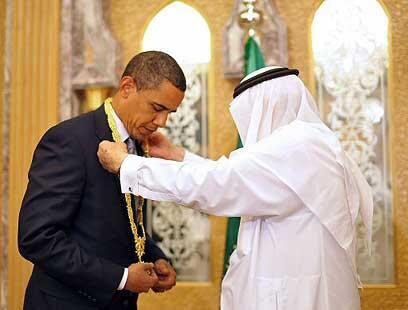President Barack Obama began his latest bid to open a dialogue with the Muslim world on Wednesday by seeking the counsel of King Abdullah of Saudi Arabia, home to Islam's two holiest sites in Mecca and Medina.
"The United States and Saudi Arabia have a long history of friendship. We have a strategic relationship," Obama said as he visited the monarch's desert horse farm. The US president called Abdullah wise and gracious, adding: "I am confident that working together that the United States and Saudi Arabia can make progress on a whole host of issues of mutual interest."
In turn, Abdullah expressed his "best wishes to the friendly American people who are represented by a distinguished man who deserves to be in this position."
Earlier, the king greeted Obama at Riyadh's main airport with a ceremony when the new US president arrived after an overnight flight from Washington. Each country's national anthem was played, the Saudi national guard was on hand and there was a 21-gun salute.
Obama and Abdullah then sat together in gilded chairs, sipped cardamom-flavored Arabic coffee from small cups and chatted briefly in public before retreating to hold private talks on a range of issues.
Around the same time Air Force One touched down in the country, pan-Arab Al-Jazeera Television broadcast a new audio tape from Osama bin Laden in which he threatened Americans and said Obama inflamed hatred toward the US by ordering Pakistan to crack down on militants in Swat Valley and block Islamic law there.
Saudi Arabia is a stopover en route to Cairo, where Obama is set to deliver a speech that he's been promising since last year's election campaign — aiming to set a new tone in America's often-strained dealings with the world's 1.5 billion Muslims.
With Abdullah alongside him, Obama told reporters: "I thought it was very important to come to the place where Islam began and to seek his majesty's counsel and to discuss with him many of the issues that we confront here in the Middle East."
In a pre-trip interview with the BBC, Obama set the tone for his swing through the Middle East, saying: "What we want to do is open a dialogue."
"You know, there are misapprehensions about the West, on the part of the Muslim world. And, obviously, there are some big misapprehensions about the Muslim world when it comes to those of us in the West," Obama said.
Looking for help on Yemeni detainees
Many of those Muslims still smolder over Iraq, Guantanamo and unflinching US support of Israel ,but they are hoping the son of a Kenyan Muslim who lived part of his childhood in Indonesia, the world's most populous Muslim country, can help chart a new course.
Aides cautioned that Obama was not out to break new policy ground in his Cairo speech, which follows visits to Turkey and Iraq in April and a series of outreach efforts including a Persian New Year video and a student town hall in Istanbul. And they said the president is not expecting quick results, even though the speech will be distributed as widely as possible.
"We don't expect that everything will change after one speech," White House spokesman Robert Gibbs said Tuesday. "I think it will take a sustained effort and that's what the president is in for."
'Open a dialogue.' Obama with Saudi King Abdullah (Photo: AFP)
Officials said Obama also wouldn't flinch from difficult topics, whether it's the Iraq and Afghanistan conflicts, the goal of a Palestinian state or democracy and human rights. Obama has been criticized for setting the address in Egypt, where President Hosni Mubarak has jailed dissidents and clung to power for nearly three decades.
In Riyadh, the president was talking to Abdullah about a host of thorny problems, from Arab-Israeli peace efforts to Iran's nuclear program. The Saudis have voiced growing concern in private that an Iranian bomb could unleash a nuclear arms race in the region.
The surge in oil prices also was on the agenda. Crude topped $68 a barrel this week, sparking fears that a fresh jump in energy costs could snuff out early sparks of a recovery from a deep global slump.
Obama likely will be looking for help from Saudi Arabia on what to do with some 100 Yemeni detainees locked up in the Guantanamo Bay prison. Discussions over where to send the Yemeni detainees have complicated Obama's plan to close the prison.
The US has been hesitant to send them home because of Yemen's history of either releasing extremists or allowing them to escape from prison.
Instead, the Obama administration has been negotiating with Saudi Arabia and Yemen for months to send them to Saudi terrorist rehabilitation centers.
The president was to stay overnight at the king's farm outside Riyadh. Abdullah, who hosted then-President George W. Bush at the ranch in January of last year, keeps some 260 Arabian horses on its sprawling grounds in air-conditioned comfort.
In any effort to court Muslims, the Saudis will be key — not just for their oil wealth, but by virtue of the authority they wield at the center of Arab history and culture.
Obama's meeting with the 84-year-old Abdullah was his second in three months. The two saw each other at the G-20 summit in London, a meeting both sides called friendly and productive. Perhaps a bit too friendly: Critics accused Obama of bowing to the Saudi monarch during a photo-op. The White House maintained he was merely bending to shake hands with a shorter man.
First published: 15:12, 06.03.9


